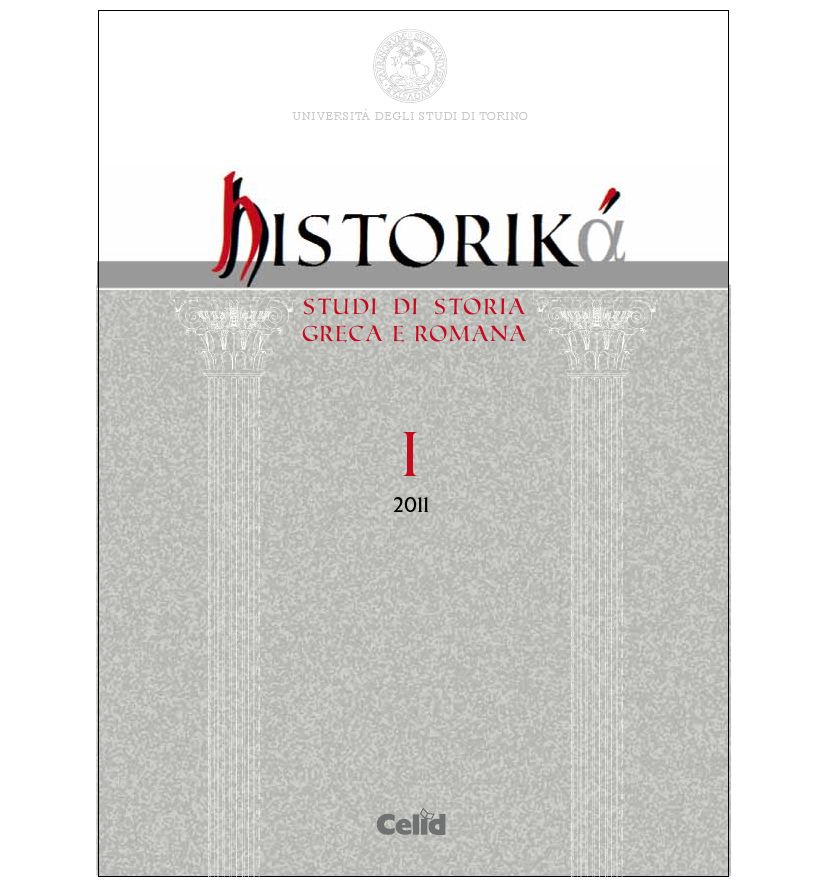La nautike dynamis in Senofonte dall’Athenaion Politeia ai Poroi
Abstract
This paper aims at examining the value of the nautike dynamis in Xenophon’s works, from Athenaion Politeia to Poroi.As already demonstrated by previous essays between 2002 and 2005, Ap was written by a young Xenophon after the events of the 411 B.C.: he positively esteems the advantages of the Athenian thalassocracy, emphasizes the relationship between sea-power and democracy and considers a government founded on the oplitai as impossible. The only limit of Athens seems to be its geographical position, as it was not an island.
Xenophon’s interest in the Athenian sea-power seems to fade in the years of the Agesilaos’ campaigns and during his stay in Sicily and his exile in Scillus. However, it returns to be significant again after Leuktra in the years of the incoming Theban egemony, when Xenophon came back from his exile. He wrote in this period the “thucydidean” part of his Hellenika and the Prokles’s speech (Hell. VII, 1, 1-14), and he introduced in the Poroi the topic of Athens as a “pacific” thalassocracy.
L’articolo considera il valore di nautike dynamis in Senofonte, dall’Athenaion politeia ai Poroi.
Come già dimostrato in precedenti saggi tra il 2002 e il 2005, Ap fu scritta dal giovane Senofonte dopo i fatti del 411 a.C.: l’opera valuta positivamente i vantaggi della talassocrazia ateniese, coglie il rapporto fra democrazia e potenza navale e considera impossibile un governo fondato sugli opliti. Il solo limite di Atene sembra la sua posizione geografica e la sua condizione non “isolana”.
L’interesse di Senofonte per la potenza navale ateniese sembra diminuire negli anni delle campagne di Agesilao, del soggiorno in Sicilia e dell’esilio a Scillunte. Esso ritorna però significativo dopo Leuttra, all’epoca dell’avvento dell’egemonia tebana, quando Senofonte rientrò dall’esilio. In questo periodo egli scrisse la parte “tucididea” delle Elleniche e il discorso di Procle di Fliunte (Hell. VII, 1, 1-14) e riprese, nei Poroi, il tema di Atene come potenza talassocratica “pacifica”.
Pubblicato
2011-10-15
Fascicolo
Sezione
Sezione tematica
Gli autori che pubblicano su questa rivista accettano le seguenti condizioni:
- Gli autori mantengono i diritti sulla loro opera e cedono alla rivista il diritto di prima pubblicazione dell'opera, contemporaneamente licenziata sotto una Licenza Creative Commons - Attribuzione che permette ad altri di condividere l'opera indicando la paternità intellettuale e la prima pubblicazione su questa rivista.
- Gli autori possono aderire ad altri accordi di licenza non esclusiva per la distribuzione della versione dell'opera pubblicata (es. depositarla in un archivio istituzionale o pubblicarla in una monografia), a patto di indicare che la prima pubblicazione è avvenuta su questa rivista.


 The journal has been approved for inclusion in DOAJ. The DOAJ listing of the journal is available at
The journal has been approved for inclusion in DOAJ. The DOAJ listing of the journal is available at 
